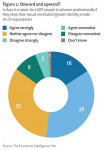Supplier failure is a major concern for manufacturers today
Despite bleak figures from the manufacturing sector over the last six months, many firms have a high degree of confidence in their ability to find and recruit highly skilled workers and take advantage of good value M&A opportunities. Still, stresses are being felt. The report, which is sponsored by Siemens PLM, shows that on many issues—access to capital, profitability, return on equity and ability to increase output—manufacturers do not believe they can achieve the targets they were reaching a year ago. But it also shows that many companies have clear ideas about implementing progressive strategies—not just to ride out the downturn, but also to emerge in a stronger position once economic recovery is in sight.
"Many manufacturers realise that simply cutting costs is a blunt instrument which can only go so far towards strengthening their competitive position," says Iain Scott, a senior editor at the Economist Intelligence Unit. "While most may be forced to trim expenditure in some way, leading companies recognise that taking more strategic steps can enhance their business both now and when the recovery materialises.
Measures include rationalising supply chains and establishing robust relationships, seeking new sources of supplies, walking away from some businesses while embracing others, and viewing operational slowdowns as opportunities to eliminate inefficiencies from their processes.
Other key findings from the survey include:
· 2009 will be tough, but few manufacturers currently anticipate a prolonged downturn. Many respondents (39%) expect conditions to improve for their company’s business within 2 years, compared with almost one-half (47%) for their sector as a whole.
· Cost-cutting is the most common response to the economic downturn's impact on business. Many respondents say staff and benefits cuts (44%) would do most to improve their cash positions, followed by new partnerships with low-cost suppliers (41%) and reduced energy consumption (36%). “Pushing back on costs” was cited by the largest group of respondents (62%) when it came to ensuring the resilience of their supply chains.
· Manufacturers see the downturn as a time to enhance their efficiency. The biggest group of respondents (63%) believe improvements to operational efficiency, both externally by rationalising supply lines and internally by using downtime to work on enhancing process efficiency, will do most to enhance their company’s competitiveness, whereas almost one-half (46%) cite changes to their organisational structure.
· Companies see a variety of business benefits emerging from the recession. Almost one-half (45%) of respondents see the growing availability of talented workers as helping their business, compared with 42% who point to the advantages of reduced competition as other companies in their sector fail. Meanwhile, M&A possibilities rank highly (39%) as business opportunities, along with lower interest rates (37%).
About the research
In February-March 2009 the Economist Intelligence Unit surveyed 354 executives in a range of manufacturing sectors: industrial, consumer goods, aerospace, chemicals, automotive, IT and technology. About one-third of respondents were in each of North America, EMEA and Asia-Pacific. The respondents had high levels of seniority—25% were CEOs, another 20% were C-level executives, and 20% were vice-presidents or directors. To supplement the survey results, we also conducted in-depth interviews with senior executives and independent experts knowledgeable about manufacturing.
About the Economist Intelligence Unit
The Economist Intelligence Unit is the business information arm of The Economist Group, publisher of The Economist. Through our global network of 650 analysts and specialists, we continuously assess and forecast political, economic and business conditions in more than 200 countries. As the world's leading provider of country intelligence, we help executives make better business decisions by providing timely, reliable and impartial analysis on worldwide market trends and business strategies.
웹사이트: http://www.eiu.com
연락처
For Economist Intelligence Unit:
Joanne McKenna
+44 (0)20 7576 8188
이메일 보내기
이 보도자료는 Economist Intelligence Unit가(이) 작성해 뉴스와이어 서비스를 통해 배포한 뉴스입니다. 뉴스와이어는 편집 가이드라인을 준수합니다.




